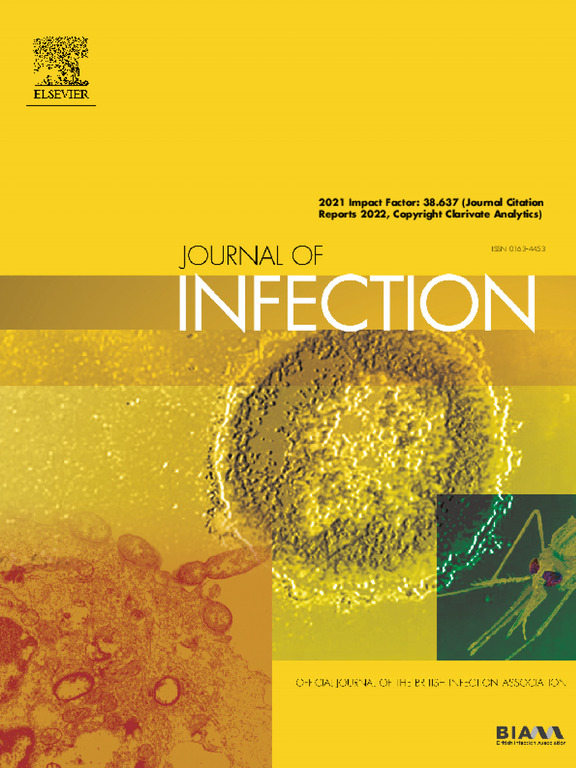对 MANTICO2 和 MONET 随机对照试验的汇总分析,比较了在 Omicron 波期间早期治疗 COVID-19 的药物疗效。
IF 14.3
1区 医学
Q1 INFECTIOUS DISEASES
引用次数: 0
摘要
背景:在 Omicron 时代,抗病毒药物和单克隆抗体 (mAbs) 的早期治疗轻度至中度 COVID-19 的临床效果尚未通过批准后的比较试验进行最终评估。我们对 Omicron 时代进行的两项随机临床试验进行了汇总分析。方法 MANTICO2/MONET 试验是对两项多中心、独立、第四阶段、三臂、优越性、随机、开放标签试验的汇总分析。患有早期轻度至中度 COVID-19(症状出现后 5 天内)且至少有一个疾病进展风险因素的非住院患者按 1:1:1 随机分配,接受 500 毫克静脉注射索托维单抗 (SOT) 或 600 毫克肌肉注射替沙吉单抗/西格维单抗 (TGM/CGM) 或 5 天口服尼尔马特韦/利托那韦 (NMV/r) 300/100 毫克 BID 疗程。主要结果为随机分组后 29 天内与 COVID-19 相关的住院或死亡。对汇总数据进行了费舍尔精确检验,并报告了总体和各臂的失败发生率及各自的 95% CI。采用未经调整的精确逻辑回归对各臂进行配对比较。此外,还利用增强反概率加权(AIPW)的双重稳健边际模型进行了分析,以估算每个治疗组的潜在结果(Pom),并通过平均治疗效果(ATE)估算其差异。随机分组后 30 天内症状持续情况的分析采用 2 级分层混合效应 logistic 模型进行,并在患者水平设置随机截距。点估计值和 95% 置信区间根据年龄和性别进行了调整,并采用类似于混合效应逻辑模型的方差分析方法进行计算。这些试验在欧洲临床试验数据库EudraCT2021-002612-31(MANTICO2)和EudraCT2021-004188-28(MONET)以及ClinicalTrials.总平均年龄为 66 岁;482 名参与者(48.80%)为男性,856 人至少接种了一个初级疗程(86%)。在观察到的 8/991 例住院病例中,有一人死亡。总体估计失败率为 0.81%(95%CI;0.35-1.58%)。NMV/r治疗组与TGM/CGM治疗组和SOT治疗组相比,主要结果的几率比(OR)分别为8.41(95% CI 1.21至无穷大;p=0.015)和2.42(95% CI 0.19至无穷大;p=0.499)。在 SOT 和 TGM/CGM 之间未观察到明显差异(OR 0.32;95% CI 0.032-1.83;p=0.174)。当我们采用边际加权模型来考虑潜在的残余混杂偏差时,结果与之相似。没有证据表明治疗组之间的症状发生率存在差异,但咳嗽除外,在 21 天的随访中,SOT 组的咳嗽发生率高于其他两组(P=0.039),在 7 天的随访中,NMV/r 组的恶心发生率高于 mAbs 组(P=0.036)。解释 NMV/r 在减少临床易感的 SARS-CoV-2 感染者在症状出现 5 天内入院治疗或死亡方面优于 TGM/CGM。各组患者的症状发生率在一段时间内没有明显差异:这些试验于2021年由意大利药物管理局(AIFA)资助。本文章由计算机程序翻译,如有差异,请以英文原文为准。
Pooled analysis of the MANTICO2 and MONET randomized controlled trials comparing drug efficacy for early treatment of COVID-19 during Omicron waves
Background
The clinical effectiveness of early therapies for mild-to-moderate COVID-19, comparing antivirals and monoclonal antibodies (mAbs) during the Omicron era, has not been conclusively assessed through a post-approval comparative trial. We present a pooled analysis of two randomized clinical trials conducted during Omicron waves.
Methods
The MANTICO2/MONET trial is a pooled analysis of two multicentric, independent, phase-4, three-arm, superiority, randomized, open-label trials. Nonhospitalized patients with early mild-to-moderate COVID-19 (≤5 days after symptoms’ onset) and at least one risk factor for disease progression were randomized 1:1:1 to receive 500 mg of intravenous sotrovimab (SOT) or 600 mg of intramuscular tixagevimab/cilgavimab (TGM/CGM) or oral 5-days course of nirmatrelvir/ritonavir (NMV/r) 300/100 mg BID. Primary outcome was COVID-19-related hospitalization or death within 29 days after randomization. Fisher’s exact test for pooled data and incidence of failure was reported as overall and by arm with respective 95% CI. Pairwise comparisons across the arms were conducted using unadjusted exact logistic regression. An analysis by means of a doubly robust marginal model using augmented inverse probability weighting (AIPW) was also conducted to estimate the potential outcomes (Pom) in each treatment group and their difference by the average treatment effect (ATE). Analysis of symptom persistence within 30 days after randomization was performed using a 2-level hierarchical mixed-effects logistic model with a random intercept at the patient’s level. Point estimates and 95% confidence intervals were adjusted for age and sex and calculated using ANOVA-like methods for the mixed effects logistic model. These trials are registered with the European Clinical Trials Database, EudraCT2021-002612-31 (MANTICO2) and EudraCT2021–004188-28 (MONET) and ClinicalTrials.gov, NCT05321394 (MANTICO2).
Findings
Between March 2022 and February 2023, 991 patients (SOT = 332, TGM/CGM = 327, NMV/r = 332) were enrolled in 15 Italian centers. The overall mean age was 66 years; 482 participants (48.80%) were male, and 856 were vaccinated with at least a primary course (86%). Among the 8/991 hospitalizations observed, one resulted in death. The overall estimate of failure was 0.81% (95%CI; 0.35–1.58%). The odds ratio (OR) for the primary outcome in the NMV/r arm compared to the TGM/CGM and SOT arms was 8.41 (95% CI 1.21 to infinity; p = 0.015) and 2.42 (95% CI 0.19 to infinity; p = 0.499), respectively. No significant difference was observed between SOT and TGM/CGM (OR 0.32; 95% CI 0.032–1.83; p = 0.174). Results were similar when we applied the marginal weighted model accounting for potential residual confounding bias. There was no evidence for a difference in the prevalence of symptoms between treatment groups, except for cough, which was higher in the SOT group compared to the other two groups at the 21-day follow-up (P = 0.039) and a higher prevalence of nausea at the 7-day follow-up in the NMV/r group compared to the mAbs group (p = 0.036).
Interpretation
NMV/r was superior to TGM/CGM in reducing hospital admission or death in clinically vulnerable patients with SARS-CoV-2 infection treated within 5 days of symptoms’ onset. No significant difference in symptom prevalence over time across the arms was found.
求助全文
通过发布文献求助,成功后即可免费获取论文全文。
去求助
来源期刊

Journal of Infection
医学-传染病学
CiteScore
45.90
自引率
3.20%
发文量
475
审稿时长
16 days
期刊介绍:
The Journal of Infection publishes original papers on all aspects of infection - clinical, microbiological and epidemiological. The Journal seeks to bring together knowledge from all specialties involved in infection research and clinical practice, and present the best work in the ever-changing field of infection.
Each issue brings you Editorials that describe current or controversial topics of interest, high quality Reviews to keep you in touch with the latest developments in specific fields of interest, an Epidemiology section reporting studies in the hospital and the general community, and a lively correspondence section.
 求助内容:
求助内容: 应助结果提醒方式:
应助结果提醒方式:


